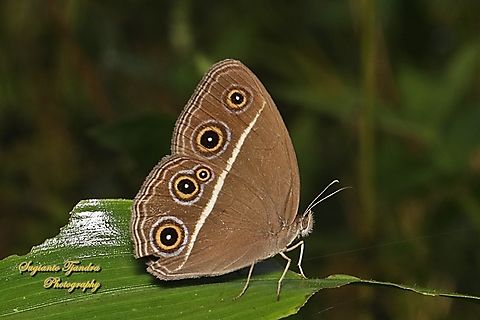
Appearance
"Orsotriaena medus" is a medium-sized butterfly with wingspan of 45 to 55 mm. The butterfly is dark brown above with a thin marginal pale border. The upper hindwing having a thin submarginal line. There are no eyespots on the upperside of the wings.Below, the butterfly has a white discal band which runs across both wings. It has five eyespots on the underside of the wings. In the forewing, it has two eyespots, with the anterior eyespot slightly smaller. In the hindwing, it has two eyespots on the apical region and a separate ocellus in the tornal region. The uppermost of the eyespots in the hindwing are greatly smaller, while the remaining two are more or less of equal sizes.
The eggs are spherical and yellowish. They are laid on the leaf blades and stems of grasses. The larvae are spindle shaped, transversely wrinkled, and covered in small tubercles, giving it a rough appearance. Two long brown spines on the head point forward, while a pair of pinkish prongs project from the anal segment. The colour above is rosy red with a blue dorsal and a white lateral line, below which, the underparts are green.
The pupae are perpendicularly suspended, slender and regular, except that the head-case is produced into a long beak formed of two thin processes like split straws. The colour is whitish brown to yellow, with faint bands of a darker shades. It resembles a large grain of barley or a tiny banana.
"Orsotriaena medus" superficially resembles members of the genus "Mycalesis", but can readily be identified by the number of spots.
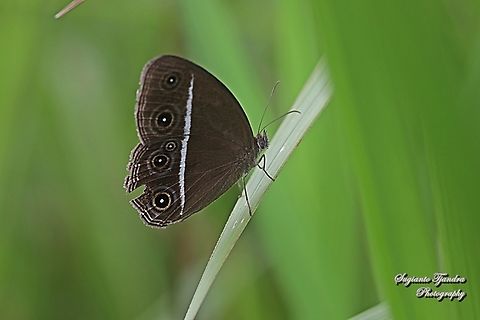
Naming
The butterfly has historically been called "nigger", but it has been renamed in Australian faunal works to smooth-eyed bushbrown.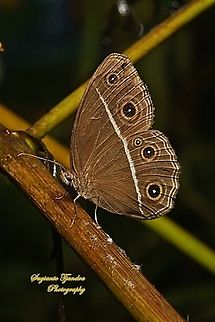
Distribution
"Orsotriaena medus" is native to India, Sri Lanka, Myanmar, Thailand, southern Yunnan, Malaysia, the Indonesian archipelago, the Philippines, New Guinea, New Britain and Australia.In India, the butterfly occurs in South India, Punjab, Uttar Pradesh, Bihar, West Bengal, Sikkim, Assam, Nagaland, the Andaman and Nicobar Islands.
"O. medus" is very common in grassy habitats up to an altitude of 1,600 m. A shy, weak-flying insect, it stays low amongst the undergrowth, and when disturbed flies for a short distance before settling down. The butterfly basks in the sun, often with its body aligned parallel to the sun's rays.
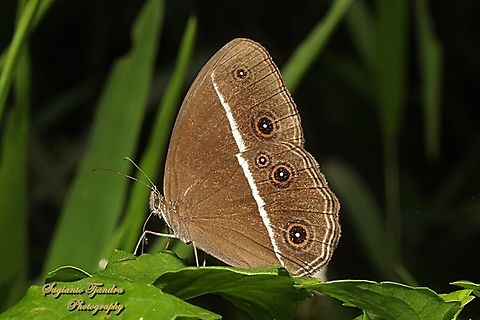
Behavior
The larvae feed on grasses, including rice plants, sugarcanes, and para grass. They are predominantly crepuscular, but can sometimes be active during daytime.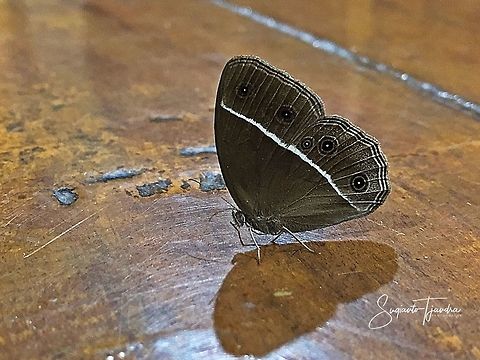
Habitat
"Orsotriaena medus" is native to India, Sri Lanka, Myanmar, Thailand, southern Yunnan, Malaysia, the Indonesian archipelago, the Philippines, New Guinea, New Britain and Australia.In India, the butterfly occurs in South India, Punjab, Uttar Pradesh, Bihar, West Bengal, Sikkim, Assam, Nagaland, the Andaman and Nicobar Islands.
"O. medus" is very common in grassy habitats up to an altitude of 1,600 m. A shy, weak-flying insect, it stays low amongst the undergrowth, and when disturbed flies for a short distance before settling down. The butterfly basks in the sun, often with its body aligned parallel to the sun's rays.The larvae feed on grasses, including rice plants, sugarcanes, and para grass. They are predominantly crepuscular, but can sometimes be active during daytime.
References:
Some text fragments are auto parsed from Wikipedia.